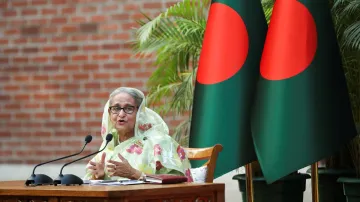Sheikh Hasina's historic tenure ends after 15 years: A look at rise and fall of Bangladesh's 'Iron lady'
Sheikh Hasina first became Prime Minister in 1996, serving until 2001. She returned to power in 2009 and has been in office since then, making her one of the longest-serving leaders in Bangladesh’s history.

In a dramatic turn of events, Sheikh Hasina, who had recently secured a record fourth consecutive term and fifth overall as Prime Minister of Bangladesh, saw her 15-year rule come to an abrupt end. Often revered by her supporters as the "Iron Lady," Hasina's tenure was marked by significant political stability in a country once frequently disrupted by military rule. However, her leadership was not without controversy, as critics often accused her of "autocratic tendencies." The 76-year-old leader is the daughter of Sheikh Mujibur Rahman, the founding father of Bangladesh. Hasina's political career, which began in the shadow of her father, ultimately led her to become one of the world's longest-serving female heads of government. Under her leadership, Bangladesh saw notable economic growth, infrastructure development, and an improved global standing.
Hasina’s exit spurs political uncertaintyDespite these achievements, Hasina’s leadership faced staunch opposition, particularly from the Bangladesh Nationalist Party (BNP), led by former Prime Minister Khaleda Zia. The BNP, along with its allies, boycotted the January election in which Hasina secured her historic fourth consecutive term, citing concerns over electoral fairness. Hasina’s departure marks the end of an era in Bangladeshi politics, leaving the future political landscape uncertain. As the country reflects on her legacy, the debate over her leadership style and the balance between stability and democracy will undoubtedly continue.
Hasina's political journey: From tragedy to triumphBorn in erstwhile East Pakistan (now in Bangladesh) in September 1947, Hasina became active in politics while studying at the University of Dhaka in the late 1960s. She served as her father's political liaison during his imprisonment by the Pakistani government. After Bangladesh gained independence from Pakistan in 1971, her father Mujibur Rahman became the president and then prime minister of the country. However, in August 1975, Rahman, his wife and their three sons were assassinated in their home by military officers. Hasina and her younger sister Sheikh Rehana survived the purge as they were abroad. Hasina, who spent six years in exile in India, was elected as the leader of the Awami League, a party founded by her father.
In 1981, Hasina returned home and became vocal about democracy in the country ruled by the military, which placed her under house arrest on multiple occasions. In the 1991 general elections, the Hasina-led Awami League failed to secure a majority. Her rival Khaleda Zia of the BNP became Prime Minister. Five years later, Hasina was elected prime minister in the 1996 general elections. Hasina was voted out of office in the 2001 elections but returned to power with a thumping victory in 2008 polls. Khaleda Zia-led BNP has been left in the lurch since then. Hasina escaped an assassination bid in 2004 when a grenade exploded at her rally.
Controversies and crackdownsSoon after coming to power in 2009, Hasina set up a tribunal to try 1971 war crimes cases. The tribunal convicted some high-profile members of the opposition, sparking violent protests. Jamaat-e-Islami, an Islamist party and a key ally of BNP, was banned from participating in elections in 2013. BNP chief Khaleda Zia was sentenced to 17 years in prison on corruption charges. The BNP boycotted the 2014 elections but joined the one in 2018, which party leaders later said was a mistake, alleging that the voting was marred with widespread rigging and intimidation. In the 2024 elections, the BNP and its allies boycotted the votes, demanding polls under a non-party caretaker government. They alleged that Hasina cannot deliver credible voting.
Election boycott and protests lead to govt collapseThe polls were fought by 27 political parties, including the parliamentary opposition Jatiya Party. Most of the remaining parties were members of the ruling coalition led by the Awami League, which experts have described as "satellite parties." The election's credibility came under scrutiny due to the boycott by the Bangladesh Nationalist Party (BNP), which resulted in a notably low voter turnout. Six months following the elections, massive protests erupted against the government over a controversial quota system. This system reserved 30 per cent of government jobs for the relatives of veterans from Bangladesh's War of Independence in 1971. The protests turned violent, leading to the deaths of over 300 protesters and ultimately resulting in the dramatic ouster of the ruling government.
(With inputs from PTI)